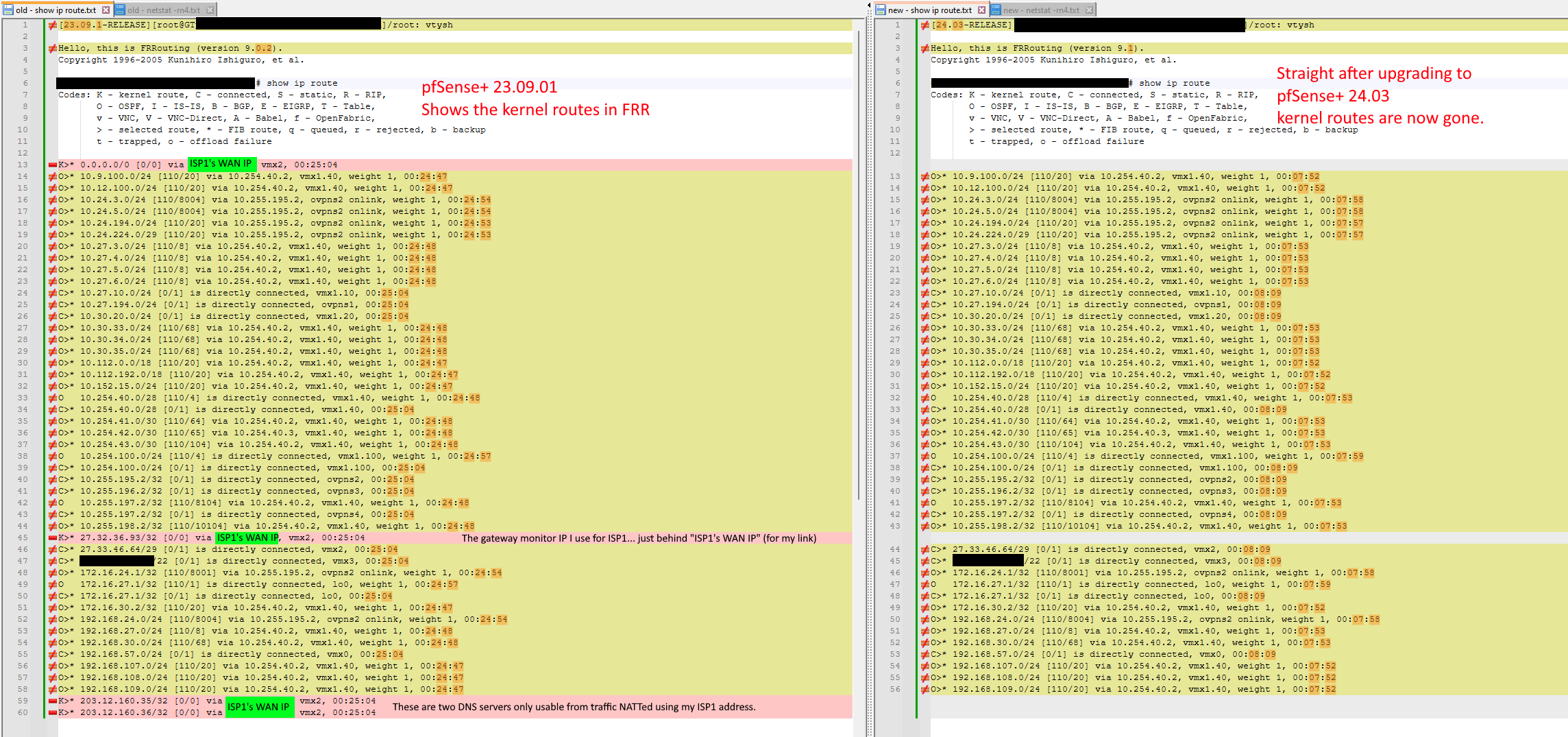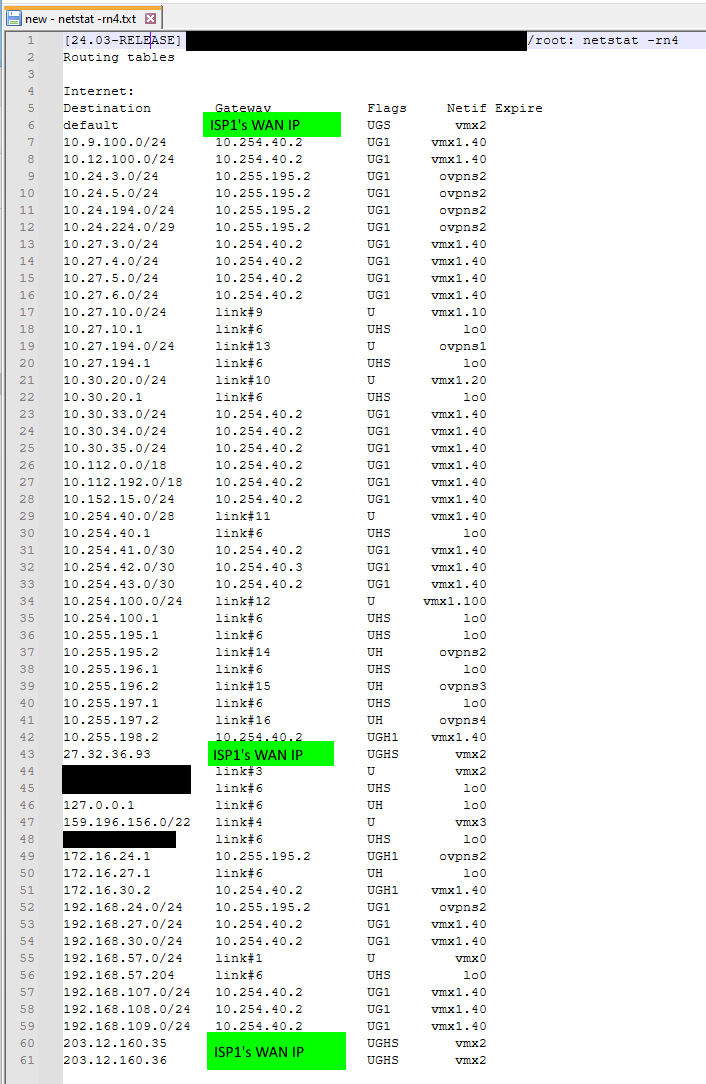Updating to pfSense+ 24.3 breaks routing - kernel routes now gone
-
@Gcon I am using version frr9-9.1_2 and on pfsense version 24.08.a.20240702.0600 and this is still an issue.
-
@Gcon said in Updating to pfSense+ 24.3 breaks routing - kernel routes now gone:
f you are insinuating that since Netgate don't develop FRR (they merely package it), that they are therefor not culpable - I would say this is a logical fallacy. It's like saying the woman who gave Alec Baldwin a loaded gun which fatally shot someone on the set of that Western movie isn't culpable because well - she didn't manufacture the gun and bullets.
- I am not insinuating anything
- Your analogy, honestly, doesn't make any sense at all
- I do agree that care should be taken when upgrading any package I think its probably in everyone's interest that documentation should include a warning that 3rd party packages are not tested fully for compatibility (my words) and could break the security and stability of critical systems. This isn't the first time a 3rd party package has caused production level issues. I would even go as far as not including updated binaries of these packages anytime there is a base software upgrade (23.09 > 24.03).
I dont know if there is an easy solution to this problem tbh.
-
@mAineAc I upgraded my lab 23.09.1 (working fine) to 24.03 and replicated the issue again. I upgraded the two packages as per the above recommendation and I unfortunately still have the issue.
Then I thought about - well what else changed with 24.03? The glaringly obvious answer is the OS itself, moving to "15.0-CURRENT" 14.x was only released late last year https://en.wikipedia.org/wiki/FreeBSD
15.x isn't even "released" yet.Maybe that is OK for apps and features built into the core of the OS. The big issue is when it comes to third-party packages like FRRouting. Why? Because the FRRouting build instructions for FreeBSD 15 simply do not exist:
https://docs.frrouting.org/projects/dev-guide/en/latest/building.htmlMaybe there is more info hiding elsewhere online, but it's conspicuously missing from the page you'd expect to find it on (the building link above). For FreeBSD - it tops out at 14. Did Netgate jump the gun, cross their fingers and hope that all the third-party packages would not break? It certainly seems that way. I don't think there should be any finger pointing at FRRouting if they haven't even certified it to run on FreeBSD 15. Crazy times.
The term "kernel" in "kernel routes" is probably a dead giveaway that the issue stems from the OS update to 15-CURRENT. I'm not saying it is but.. where there is smoke...
So 9.1.1 unfortunately hasn't fixed the issue, and I suspect no version of FRR released to date will fix the issue, when paired with FreeBSD 15-CURRENT. This major OS update has changed something fundamentally in the kernel, and until FRR software gains official build support for FreeBSD 15, we are all probably wasting our time with this.
-
@Gcon What really bothers me about this is in the OSPF settings themselves. If you select to redistribute the default route always the kernel routing table should not make a difference. It should be redistributing the default route whether there is a default route or not.
Edit: I was just looking at the /var/etc/frr/frr.conf file and the ospf config does not even have the redistribute default command in it at all. with or without always.
Edit 2: Actually the originate default is in there. If that option is selected, but originate default always does not appear. If you don't have the redistribute default option selected and just the redistribute default always it will not appear in the config at all. Not sure if both should be selected, but the originate default always never appears in the config.
-
@marcosm
Marcos l, I can’t find anything upstream that indicates this is an issue (maybe I missed it). Is this an issue acknowledged by any maintainers? FRR is just in an unusable state -
Let's try to keep the discussion focused on resolving the issue. To recap a bit...
Reports indicate that:
- The issue does not happen on 23.09.1 with FRR 9.0.2.
- The issue is still present on 24.03 with the latest FRR version; ref 1180159.
- OSPF-learned default routes do not get redistributed; ref 189051.
- These default routes may not get added to the kernel's routing table, though sometimes they do get added; ref 1172657.
Some things to try next in no particular order:
- Test with the latest FRR version on 23.09.1 (which is on FreeBSD 14).
- Diff the FRR and pfSense config between 23.09.1 and 24.03. The package GUI hasn't had any changes that would affect this, but changes in pfSense itself could.
- Check the routing, system, and gateway logs when the issue happens (see "Syslog Logging" option in the package's Global Settings).
- Check if the issue is reproducible with a floating state policy (see "Firewall State Policy" in System > Advanced > Firewall & NAT). It's unlikely this would affect the issue, but it's easy an easy test.
-
@marcosm agreed.
I can spin up a vm in the next few hours but I think the folks here got a working lab now. I’ll report back with the findings -
@marcosm I have done tests. I would have done them sooner but I'm in a different time zone.
In my GNS3 lab I booted up my simulated ISP router then booted just the pfsense+ firewall, but no other ospf peers behind the firewall, which cuts down the amount of routes in the routing table which aren't relevant.
Results:
No issue on 23.09.01 with FRR 9.0.2.
The issue did occur running 23.09.01 with FRR 9.1.1Note the versions and kernel routes missing on the right (in pink).

I can boot up the pfsense+ firewall multiple times, and each time the routes are consistent as shown above. 9.0.2 always has the K routes. 9.1.1 never does - at least on boot up and with no other instability or config changes.
I diffed the /var/etc/frr/frr.conf from 9.0.2 and 9.1.1 and for me - exactly the same. I haven't checked config against 24.3 but might not need to, now that I see that even 23.09.1 is affected with the package update.
When I reboot the virtualized Cisco 7200 I'm using to represent my ISP in my GNS3 simulation lab, the K route shows up:

You can see from the timestamps and see I had the lab up for 20 mins before I rebooted the virtual ISP and then you can see the default route K route show up after that (in green).
It looks like some race condition on boot up, because if you shake things up post-boot, you can coax some K routes out of it as I have shown. Another example. Under System > General Setup, if I change two of the DNS servers to point to "none" and save, then change it back to what I had it pointing down WAN1, I can then get two more K routes to show up. And I could probably toggle something else to get the forth and final one to show up.
Obviously this is not a workable solution. As 24.3 has FRR 9.1, it does seem to me like a race condition was introduced into FRR (at least on FreeBSD14 / FreeBSD15) going from 9.0.2 to 9.1
As for system logs and policy state impact - I will have a look at that next.
@mAineAc I am definitely interested in analysing default-route origination and/or redistribution at some point (as that affects me too) but maybe that's a different issue not related to this apparent race condition? Not sure. I just want my K routes back like they were in 9.0.2, and when those are again reliable - I can look at the other things.
EDIT: I changed "Firewall State Policy" in "System / Advanced / Firewall & NAT" from Floating States to Interface Bound States and it made no difference, so changed it back.
Also it doesn't seem to be a race condition on boot up, because post-boot, if I restart FRR by either unticking then reticking it in "Services / FRR / Global Settings" or by clicking "Force Service Restart" at the bottom of that page - the issues are still there.
If I tickle the things that make the K routes show up, and then restart the process, the K routes disappear again.
With the fault condition in place, and the firewall having two WAN links (one to WAN1 and one to WAN2). If I log into the ISP1 router and I shut the link to the firewall WAN1, after about 20 seconds, a K route (default-route) will show up on the firewall pointing to WAN2. When I unshut the ISP interface on the ISP end, after 60 seconds the K route default-route swapped over to WAN1
I have the two WANs in a Gateway Group with WAN1 as Tier1, and WAN2 as Tier2.
I enabled syslog logging for FRR, with package logging level "extended". Nothing stood out to me in the logs. Tailing the logs when I reload FRR just gives me this:
Aug 13 02:05:18 GTpfsense01 php-fpm[16405]: /pkg_edit.php: Configuration Change: Aug 13 02:05:18 GTpfsense01 check_reload_status[457]: Syncing firewall Aug 13 02:05:18 GTpfsense01 php-fpm[16405]: FRR Package: FRR BGPd: No config data found. Aug 13 02:05:18 GTpfsense01 php-fpm[16405]: FRR Package: FRR OSPF6d: No config data found. Aug 13 02:05:18 GTpfsense01 php-fpm[16405]: FRR Package: FRR RIPd: No config data found. Aug 13 02:05:18 GTpfsense01 php-fpm[16405]: FRR Package: FRR BFDd: No config data found. Aug 13 02:05:18 GTpfsense01 php-fpm[16405]: FRR Package: FRR: Rebuild configuration. Aug 13 02:05:18 GTpfsense01 php-fpm[16405]: FRR Package: FRR: Daemon state: zebra: running | mgmtd: running | staticd: running | ospfd: running Aug 13 02:05:18 GTpfsense01 php-fpm[16405]: FRR Package: FRR: Service restart forced. Aug 13 02:05:18 GTpfsense01 php-fpm[16405]: FRR Package: FRR: Restarting services. Aug 13 02:05:19 GTpfsense01 staticd[16920]: [MRN6F-AYZC4] Terminating on signal Aug 13 02:05:19 GTpfsense01 mgmtd[16272]: [X3G8F-PM93W] BE-adapter: mgmt_msg_read: got EOF/disconnect Aug 13 02:05:19 GTpfsense01 mgmtd[16272]: [J2RAS-MZ95C] Terminating on signal Aug 13 02:05:20 GTpfsense01 mgmtd[87833]: [VTVCM-Y2NW3] Configuration Read in Took: 00:00:00 Aug 13 02:05:20 GTpfsense01 staticd[88655]: [VTVCM-Y2NW3] Configuration Read in Took: 00:00:00 -
Ruling out changes between pfSense versions is very helpful. Before we can say it's an issue in FRR or even a bug at all, let's try to understand what exactly is happening. I'm hoping the logs will have a clue.
-
@marcosm I just edited my note with some extra info. Is it possible to get packages built for 10.1 and I can test those? https://www.frrouting.org/release/. Or even 9.0.3, just to confirm even more that the issue stems from the 9.0.x jump to 9.1.x.
-
Here's frr9.0.3.
-
@marcosm Thanks. 9.0.3 is still fine. Straight after boot up:
[23.09.1-RELEASE][root@GTpfsense01.<<hidden>>]/root: vtysh Hello, this is FRRouting (version 9.0.3). Copyright 1996-2005 Kunihiro Ishiguro, et al. GTpfsense01.<<hidden>># show ip route Codes: K - kernel route, C - connected, S - static, R - RIP, O - OSPF, I - IS-IS, B - BGP, E - EIGRP, T - Table, v - VNC, V - VNC-Direct, A - Babel, f - OpenFabric, > - selected route, * - FIB route, q - queued, r - rejected, b - backup t - trapped, o - offload failure K>* 0.0.0.0/0 [0/0] via <<hidden>>, vmx2, 00:00:53 C>* 10.27.10.0/24 [0/1] is directly connected, vmx1.10, 00:00:53 C>* 10.27.194.0/24 [0/1] is directly connected, ovpns1, 00:00:53 C>* 10.30.20.0/24 [0/1] is directly connected, vmx1.20, 00:00:53 C>* 10.254.40.0/28 [0/1] is directly connected, vmx1.40, 00:00:53 C>* 10.254.100.0/24 [0/1] is directly connected, vmx1.100, 00:00:53 C>* 10.255.195.2/32 [0/1] is directly connected, ovpns2, 00:00:53 C>* 10.255.196.2/32 [0/1] is directly connected, ovpns3, 00:00:53 C>* 10.255.197.2/32 [0/1] is directly connected, ovpns4, 00:00:53 K>* <<hidden>>/32 [0/0] via <<hidden>>, vmx2, 00:00:53 C>* <<hidden>>/29 [0/1] is directly connected, vmx2, 00:00:53 C>* <<hidden>>/22 [0/1] is directly connected, vmx3, 00:00:53 C>* 172.16.27.1/32 [0/1] is directly connected, lo0, 00:00:53 C>* 192.168.57.0/24 [0/1] is directly connected, vmx0, 00:00:53 K>* 203.12.160.35/32 [0/0] via <<hidden>>, vmx2, 00:00:53 K>* 203.12.160.36/32 [0/0] via <<hidden>>, vmx2, 00:00:53 GTpfsense01.<<hidden>>#This was about a minute after boot up. No issues with K routes. All 4 expected ones - most crucially the default - are all there.
So something in the 9.1.x series broke K routes on FreeBSD14/15 when starting the FRR service. If you "tickle" things when the service is running - like a remote interface shutdown and unshut, or config change and change-back. The K routes can be coaxed out, but obviously - this is not workable/practical.
https://frrouting.org/release/9.1/
"FRR 9.1 brings a long list of enhancements and fixes with 941 commits from 73 developers."I scanned the CI
https://ci1.netdef.org/browse/FRR-FRR121/Then scanned the tests for FreeBSD
https://ci1.netdef.org/browse/FRR-FRR121-FBSD14AMD-101/testThat all seems to be just BGP specific. There doesn't seem to be any CI tests specifically for FreeBSD and this functionality of K routes. No wonder regressions come in like this - if no one is testing for it. Geez, what a nightmare - trying to find out which of the 941 commits to 9.1 broke it on FreeBSD.
Maybe Alexander Skorichenko askorichenko@netgate.com can provide some input, as he signed off on one of the changes backported to 9.1 https://ci1.netdef.org/browse/FRR-FRR121-54
Do you think it could be related to my NIC type? I am using VMware vmxnet3 for both production and lab. I can rebuild in my GNS3 lab as igbX NICs to see if that changes anything. Mind you in production I am tied to vmxnet3 as anything other than the paravirtualized vmxnet3 NICs give comparatively poor performance (the alternative being e1000e but that does not perform well at scale). So it would only be for information gathering. vmxnet3 works wonderfully for FRR 9.0.x shouldn't shouldn't have to change virtualized NIC types because someone broke vmxnet3. But I'll test anyway and see what I get.
-
Thank you for testing. Let's try our luck with frr10.1 then. We can determine the next steps after that.
-
@marcosm Thank you so much for your package builds.
9.0.3 is on the left, and 10.1 is on the right:
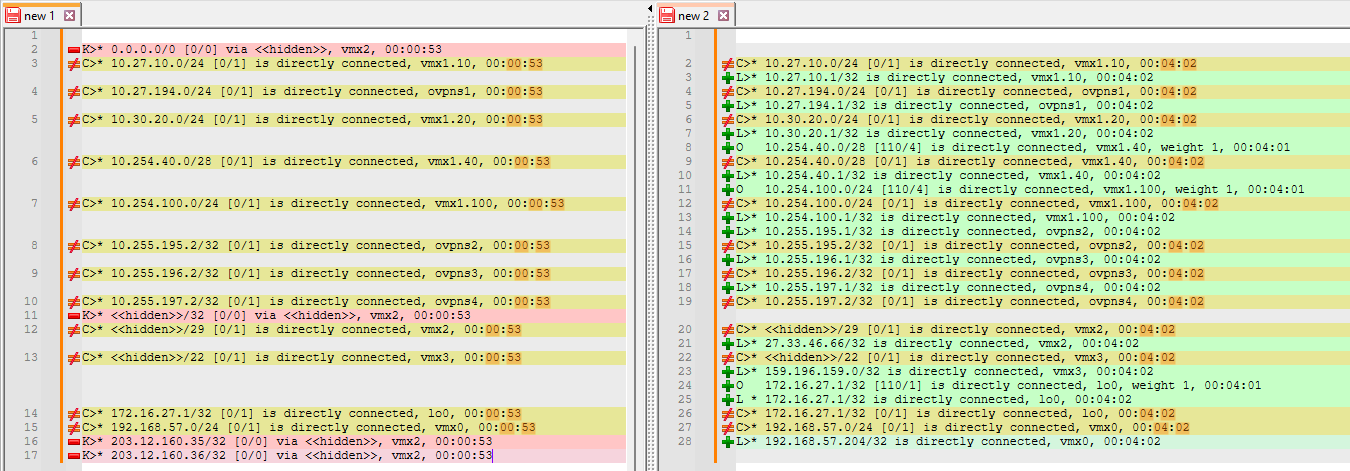
In 10.1, these L routes (local) show up. First time I've seen those in FRR. They are some interface IPs. A few OSPF routes show up in that as well. Unfortunately no K routes.
The "tickle techniques" I have mentioned previously can still be used to coax the K routes back.
My current suspicions are that it's something to do with something changing from 9.0.x to 9.1 in relation to vmxnet3 NICs. I tried rebuilding to e1000e "emX" NICs but that didn't go so well - I remapped and that took a long time to process - about half an hour - and then after reboot, things seem to get stuck on loading VLAN interfaces.
I wouldn't want to have to change NIC types in production. Especially when vmxnet3 should work fine, and is the recommended type for VMware/ESXi https://docs.netgate.com/pfsense/en/latest/recipes/virtualize-esxi.html
I have always had Hardware TSO and LRO disabled. I tried also disabling hardware checksum offload but that didn't help.
EDIT: In the same lab I have a pfSense 2.7.2 CE box emulating Intel 82545EM NIC (similar to e1000e) and I upgraded that to FRR 10.1, and the kernel routes were still there afterwards. I am suspecting that FRR from 9.1 onwards doesn't play well with vmxnet3 paravirtualized NICs on FreeBSD14/15.
-
I wouldn't think the interface driver would matter in this case, but I suppose it's possible. Anyway, we'll try to get FRR10 in for 24.08. Given that testing shows this is more likely to be an issue with the package, I suggest looking through the upstream issues and opening an issue report there (and link it on the redmine).
For now, I will attach add frr9.0.3 to the redmine to serve as a temporary workaround for those that need it.
-
 K keyser referenced this topic on
K keyser referenced this topic on
-
@marcosm I did some more testing, and you were right in thinking that the interface driver wouldn't matter in this case. I wanted confirmation though, so I made a completely separate GNS3 lab so that I wouldn't have to keep blacking out my WAN addresses and FQDN's. This is the lab:
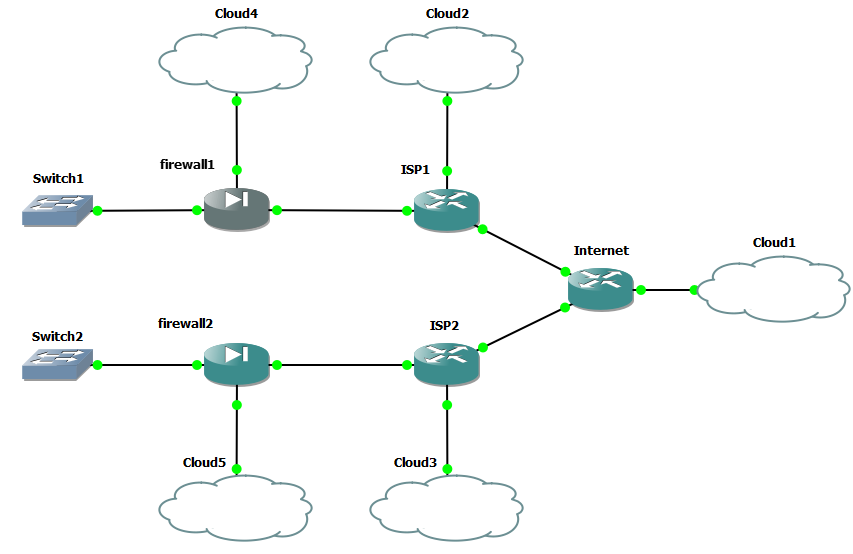
The clouds are just so I can get HTTP access to the devices, and cloud1 also provides Internet to the lab, for the initial FRR package installs.
Both firewalls are pfSense CE 2.7.2 fresh installs.
They only differ in hardware for NIC types.
Firewall 1 emulates Intel 82576 (igb#)
Firewall 2 emulates VMware vmxnet3 (vmx#)I checked the route tables in FRR, when running the default FRR 9.0.2. and there was a single K route for both. I would assume that FRR 9.0.3 also has this, given my previous testing:
[2.7.2-RELEASE][root@firewall1.home.arpa]/root: vtysh Hello, this is FRRouting (version 9.0.2). Copyright 1996-2005 Kunihiro Ishiguro, et al. firewall1.home.arpa# show ip route Codes: K - kernel route, C - connected, S - static, R - RIP, O - OSPF, I - IS-IS, B - BGP, E - EIGRP, T - Table, v - VNC, V - VNC-Direct, A - Babel, f - OpenFabric, > - selected route, * - FIB route, q - queued, r - rejected, b - backup t - trapped, o - offload failure K>* 0.0.0.0/0 [0/0] via 192.0.2.1, igb0, 00:00:21 C>* 192.0.2.0/29 [0/1] is directly connected, igb0, 00:00:21 C>* 192.168.41.0/24 [0/1] is directly connected, igb1, 00:00:21 C>* 192.168.57.0/24 [0/1] is directly connected, igb5, 00:00:21 firewall1.home.arpa# [2.7.2-RELEASE][root@firewall2.home.arpa]/root: vtysh Hello, this is FRRouting (version 9.0.2). Copyright 1996-2005 Kunihiro Ishiguro, et al. firewall2.home.arpa# show ip route Codes: K - kernel route, C - connected, S - static, R - RIP, O - OSPF, I - IS-IS, B - BGP, E - EIGRP, T - Table, v - VNC, V - VNC-Direct, A - Babel, f - OpenFabric, > - selected route, * - FIB route, q - queued, r - rejected, b - backup t - trapped, o - offload failure K>* 0.0.0.0/0 [0/0] via 192.0.2.9, vmx0, 00:00:36 C>* 192.0.2.8/29 [0/1] is directly connected, vmx0, 00:00:36 C>* 192.168.42.0/24 [0/1] is directly connected, vmx1, 00:00:36 C>* 192.168.57.0/24 [0/1] is directly connected, vmx5, 00:00:36 firewall2.home.arpa#I then stopped FRR, and installed FRR 9.1.1. Results:
[2.7.2-RELEASE][root@firewall1.home.arpa]/tmp: vtysh Hello, this is FRRouting (version 9.1.1). Copyright 1996-2005 Kunihiro Ishiguro, et al. firewall1.home.arpa# show ip route Codes: K - kernel route, C - connected, S - static, R - RIP, O - OSPF, I - IS-IS, B - BGP, E - EIGRP, T - Table, v - VNC, V - VNC-Direct, A - Babel, f - OpenFabric, > - selected route, * - FIB route, q - queued, r - rejected, b - backup t - trapped, o - offload failure C>* 192.0.2.0/29 [0/1] is directly connected, igb0, 00:00:10 C>* 192.168.41.0/24 [0/1] is directly connected, igb1, 00:00:10 C>* 192.168.57.0/24 [0/1] is directly connected, igb5, 00:00:10 firewall1.home.arpa# [2.7.2-RELEASE][root@firewall2.home.arpa]/tmp: vtysh Hello, this is FRRouting (version 9.1.1). Copyright 1996-2005 Kunihiro Ishiguro, et al. firewall2.home.arpa# show ip route Codes: K - kernel route, C - connected, S - static, R - RIP, O - OSPF, I - IS-IS, B - BGP, E - EIGRP, T - Table, v - VNC, V - VNC-Direct, A - Babel, f - OpenFabric, > - selected route, * - FIB route, q - queued, r - rejected, b - backup t - trapped, o - offload failure C>* 192.0.2.8/29 [0/1] is directly connected, vmx0, 00:01:19 C>* 192.168.42.0/24 [0/1] is directly connected, vmx1, 00:01:19 C>* 192.168.57.0/24 [0/1] is directly connected, vmx5, 00:01:19 firewall2.home.arpa#So yes - NIC type doesn't seem to matter. Well there's over 20 NIC types to choose from in GNS3... but I'll just stop at 2 for now. We know it is at least not limited to vmxnet3. Also not related to OSPF as I am not running it in this lab. I am not running any routing protocols. I also checked the routing tables in FRR 9.1.1 about 20 minutes afterwards, and still no K routes. I wasn't even able to coax the K routes to come out by rebooting ISP1 and ISP2. In this lab, I only have a single WAN on each firewall, unlike my production lab, where I have dual WAN links.
Thanks for the link to the upstream issues. I'll go through them and see if it's known. If not then I'll log the issue.
-
If you're not running any dynamic routing on that lab and the default route is still missing - where is it supposed to come from? Is it just defined as a static route in Zebra?
-
@marcosm I have updated 15623 with my findings. 9.0.3 works without issue for displaying 0/0 route
-
@marcosm I don't know why the default route still works when it goes missing in FRR. Perhaps it falls back to the system/kernel routing table for any destinations not found in the FRR RIB/FIB?
[2.7.2-RELEASE][root@firewall1.home.arpa]/root: vtysh Hello, this is FRRouting (version 9.1.1). Copyright 1996-2005 Kunihiro Ishiguro, et al. firewall1.home.arpa# show ip route Codes: K - kernel route, C - connected, S - static, R - RIP, O - OSPF, I - IS-IS, B - BGP, E - EIGRP, T - Table, v - VNC, V - VNC-Direct, A - Babel, f - OpenFabric, > - selected route, * - FIB route, q - queued, r - rejected, b - backup t - trapped, o - offload failure C>* 192.0.2.0/29 [0/1] is directly connected, igb0, 00:12:30 C>* 192.168.41.0/24 [0/1] is directly connected, igb1, 00:12:30 C>* 192.168.57.0/24 [0/1] is directly connected, igb5, 00:12:30 firewall1.home.arpa# show ip fib Codes: K - kernel route, C - connected, S - static, R - RIP, O - OSPF, I - IS-IS, B - BGP, E - EIGRP, T - Table, v - VNC, V - VNC-Direct, A - Babel, f - OpenFabric, > - selected route, * - FIB route, q - queued, r - rejected, b - backup t - trapped, o - offload failure C>* 192.0.2.0/29 [0/1] is directly connected, igb0, 00:12:33 C>* 192.168.41.0/24 [0/1] is directly connected, igb1, 00:12:33 C>* 192.168.57.0/24 [0/1] is directly connected, igb5, 00:12:33 firewall1.home.arpa# exit [2.7.2-RELEASE][root@firewall1.home.arpa]/root: netstat -rn4 Routing tables Internet: Destination Gateway Flags Netif Expire default 192.0.2.1 UGS igb0 127.0.0.1 link#8 UH lo0 192.0.2.0/29 link#1 U igb0 192.0.2.2 link#8 UHS lo0 192.168.41.0/24 link#2 U igb1 192.168.41.1 link#8 UHS lo0 192.168.57.0/24 link#6 U igb5 192.168.57.204 link#8 UHS lo0 [2.7.2-RELEASE][root@firewall1.home.arpa]/root: traceroute 8.8.8.8 traceroute to 8.8.8.8 (8.8.8.8), 64 hops max, 40 byte packets 1 192.0.2.1 (192.0.2.1) 1.736 ms 1.638 ms 1.182 ms 2 192.168.1.1 (192.168.1.1) 1.958 ms 2.197 ms 1.552 ms 3 192.168.57.1 (192.168.57.1) 2.678 ms 2.682 ms 2.554 ms 4 10.231.48.10 (10.231.48.10) 23.731 ms 22.466 ms 21.816 ms 5 ae10.chw-ice301.sydney.telstra.net (203.50.61.65) 22.058 ms 22.454 ms ae10.ken-ice301.sydney.telstra.net (203.50.61.81) 24.173 ms 6 bundle-ether25.hay-core30.sydney.telstra.net (203.50.61.80) 22.530 ms bundle-ether25.stl-core30.sydney.telstra.net (203.50.61.64) 24.026 ms bundle-ether25.hay-core30.sydney.telstra.net (203.50.61.80) 23.712 ms 7 bundle-ether1.chw-edge903.sydney.telstra.net (203.50.11.177) 22.088 ms 22.215 ms 22.276 ms 8 goo2503144.lnk.telstra.net (58.163.91.202) 23.689 ms goo2503069.lnk.telstra.net (58.163.91.194) 22.960 ms 72.14.212.22 (72.14.212.22) 23.076 ms 9 192.178.97.87 (192.178.97.87) 24.997 ms 192.178.98.33 (192.178.98.33) 23.710 ms 192.178.98.21 (192.178.98.21) 23.375 ms 10 142.251.64.177 (142.251.64.177) 23.976 ms 142.251.64.179 (142.251.64.179) 23.778 ms 216.239.56.69 (216.239.56.69) 23.841 ms 11 dns.google (8.8.8.8) 27.750 ms 23.449 ms 23.632 msIn my basic lab here, I just have the gateway configured like so:
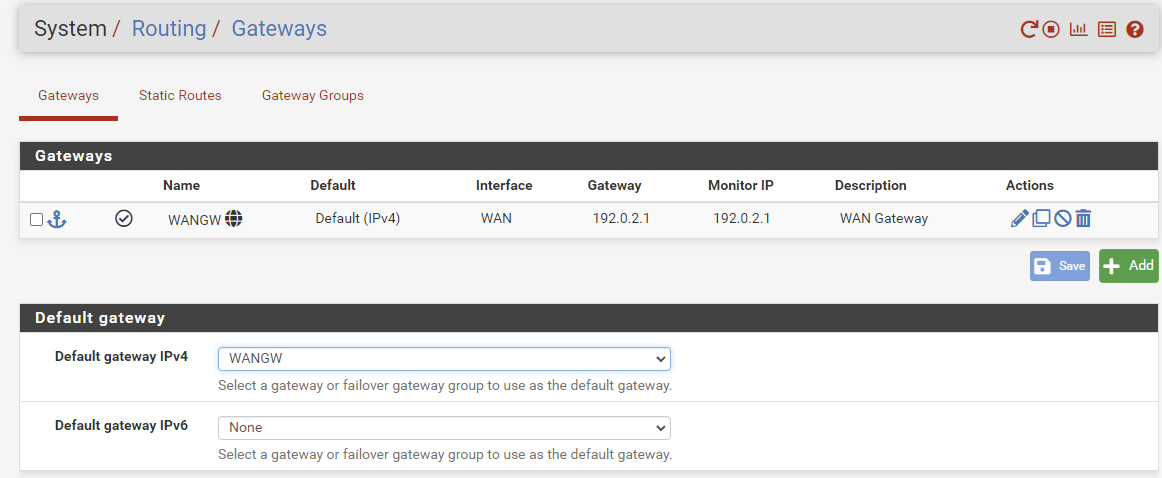
Just to recap the issue in my production network: Since that default gateway / (default route) doesn't show up as a kernel route in FRR (from FRR 9.1 and onwards), the situation is that when the pfSense firewall with this affliction learns a default route via OSPF from another router device behind it (on the firewall "LAN"), the whole network Internet traffic still arrives at the pfSense firewall, because it is still advertising the default route into the network and has the lowest cost, but then the pfSense then decides to send the traffic back to the LAN router - back to where it came from. It crazily thinks that some high-cost OSPF route is a better option than its directly connected default gateway, and it shouldn't. It was working fine before that. Fine in 9.0.2 / 9.0.3.
I guess not too many people run OSPF on their network with a competing default route? Otherwise people would be screaming about this issue all over the place. It would be broken for everyone right now on the new code, but the breakage only affects certain topologies.
The secondary default route I have is across a 700Mbps microwave link to a remote site that also has an pfSense firewall with a fairly low-speed Internet link. If the main site's internet goes down, then the customer traffic ends up going to the LAN router (Mikrotik Cloud Core LAN router) as normal and then takes the high-cost OSPF route across the microwave link to the remote site and still have Internet (vs the low-cost OSPF route to the local pfSense router).
I fixed this issue on the day by turning off the remote firewall's advertisement of OSPF (put in a temporary static route where needed). Then afterhours I used the Netgate Installer to reinstall the previous version of pfSense Plus, to get the earlier FRR back. Now both are advertising their default routes and redundancy is fine. Just want to get this issue solved so I can upgrade the main site to pfSense Plus 24.3... 24.8 etc.
-
To clarify, is the default route is missing from both Zebra and the kernel, or just Zebra?
It crazily thinks that some high-cost OSPF route is a better option than its directly connected default gateway, and it shouldn't.
Is this happening while the lower-cost route exists in the kernel? If so, is that happening with newly established traffic as well (as in not traffic for which states already exist)?
